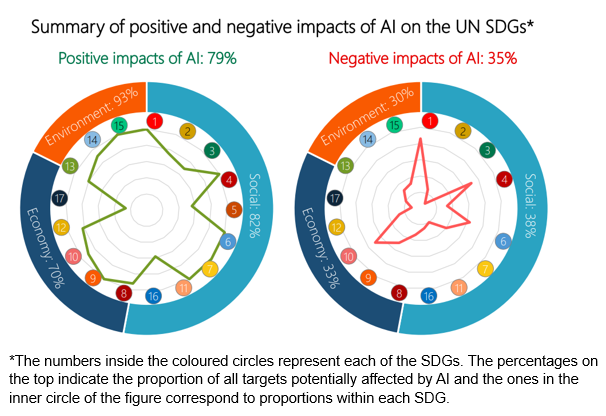Transformative progress in Artificial Intelligence (AI) has generated a mix of excitement and concern. Large Language Models (LLMs) - the genus that powers ChatGPT - continue to impress with their remarkable abilities. What is perhaps less explored is the plethora of implications the growth of AI has for Environmental, Social, and Governance (ESG) considerations.
Scope of AI-driven ESG benefits
AI has the potential to address long-standing sustainability issues, some of which include:
- Enhanced ESG Ratings
- Advanced Climate Modelling
- Improved Governance and Transparency
- Accurate Corporate Disclosures
Research also indicates that AI can contribute significantly to achieving 134 targets within the United Nations' Sustainable Development Goals (SDGs). This includes poverty reduction, better education, clean energy, infrastructure development, and sustainable urban communities. While the study also found that AI may inhibit 59 targets, on balance, AI appears to be more of an enabler rather than an inhibitor of the SDG targets.

ESG Concerns Amid AI's Advancement
Yet, the rapid growth of AI raises ethical and environmental issues:
- High energy Consumption: AI models require substantial computational power, leading to increased energy use and carbon emissions.
- Social and Governance Challenges: Concerns arise about job security, data protection, and privacy.
The Future of Work and Global Impact
AI's automation potential prompts questions about job displacement but also offers increased productivity. Estimates suggest AI could boost global labour productivity growth by 1.4% over a ten year period, similar to previous transformative technologies like electricity and the internet. This impact on productivity could add trillions of dollars in value to the global economy
Balancing AI's Promise and Challenges
AI presents unique opportunities and challenges. To harness its potential, there is a pressing need for coherent AI governance frameworks that can keep pace with the rapid evolution of this technology. Engagement is key, with governments, regulators, businesses, investors, and the financial sector working together to guide AI's role in advancing ESG principles.
In conclusion, AI's evolution has the power to reshape sustainability and promote a fairer society. However, its rapid development requires thoughtful regulation and collaborative efforts to ensure a positive impact on ESG issues.
The full report can be downloaded for free here.


